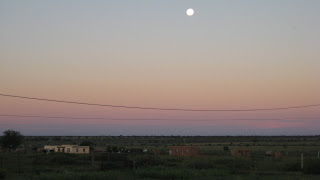 As I've warned you before, this blog follows chronology only very roughly, this entry is about nine months old...
As I've warned you before, this blog follows chronology only very roughly, this entry is about nine months old... My host father has asked me several times if I can take a sheep or a goat back to 
That is an accurate picture of life here. Gratefulness is still measured in cows, sheep, and goats. For my birthday, in fact, my host family slaughtered a sheep for me (well, I helped… wearing gloves this time) and told me to invite people over, which fortunately coincided with Thanksgiving, and even though we were on travel restriction, Peace Corps allowed us to visit our closest volunteer and share Thanksgiving with them. Luckily I’m the closest neighbor to several volunteers. So I turned 23 in the Thanksgivithday celebration.
This proved to be quite an occasion as one of my teacher’s shared my birthday and was over for the braai, a South African BBQ. We, all of us, prepared half the food South African Style- Pap or bogobe, a stiff porridge made of maizemeal, and then threw in some American overtones, salad, mashed potatoes, and green beans. Sharing cultures through food…. There really is nothing as lekker.
One wonderful thing about South African families is that you know who your relatives are… that is unless you are a Peace Corps volunteer and suddenly have 30 or so more new and intriguing names and faces to remember. I ended up making a rather elaborate family tree to help me out on this one. But I digress, family is central to the interconnectedness of rural South African life. I don’t mean this in a traditional western sense. Family, especially the term uncle, is a much looser concept. Uncle is both a term for your parent’s brother or brother-in-law, but also a term of respect for someone who wouldn’t be considered your uncle in the western sense. Family is everyone who is remotely related to you. 
And so part of the family came over from the neighboring village and partook in the feast, as did the local family. One interesting feature of the evening was when we brought tables outside, the Americans were quite a ease sitting at the candle-lit table and sharing the meal in that manner, whereas my African host family chose to sit in a circle, as they was their custom. In the end, we did manage to mingle, but it was quite humorous and poignant to see the differing cultures reflected so visibly.
It was also amusing to see the different interactions we had with one another. Some of my host family seemed to feel a little awkward around the handful of Americans that were there. The volunteers were less awkward, or to quote a volunteer, “Awkwardness becomes the norm for us, so awkward ceases to exist.” Since I knew everyone who came, I could see how differently some people acted.
One of the remarkable aspects of the BaTswanan culture is their openness to strangers and eagerness to be hospitable. The visitor is well treated, to the point of the ‘Tswana avoiding any particular topic that might lead to conflict. Now this is true in other cultures as well, but I found a particular iteration in my time here, where I notice people doing everything to make me feel well for the moment, including the extreme of telling me they’ll do something, even though they have no intention of actually doing it, just so that I will feel good at the moment. The fact that I will be let down later can be tempered, but there are very few times a person will tell you something that will let you down. And so some in my host family were exceedingly cautious in talking with the volunteers not wishing to disappoint, which lasted until they were repeatedly invited to come and sit with us at the table in a typical Thanksgiving style. Ple ase don’t get me wrong, I also joined my host family’s circle, but felt that unless they were invited repeatedly to the table, they would not come. And so, surrounded by some of my friends in Peace Corps and my host country national host family, we celebrated Thankgivirthday until the candles had burned low on the tables and the Milky Way stretched brilliantly across the night sky.
ase don’t get me wrong, I also joined my host family’s circle, but felt that unless they were invited repeatedly to the table, they would not come. And so, surrounded by some of my friends in Peace Corps and my host country national host family, we celebrated Thankgivirthday until the candles had burned low on the tables and the Milky Way stretched brilliantly across the night sky.
A few weeks later, my host father asked if I could take a goat home on the plane with me. I was honored.
No comments:
Post a Comment